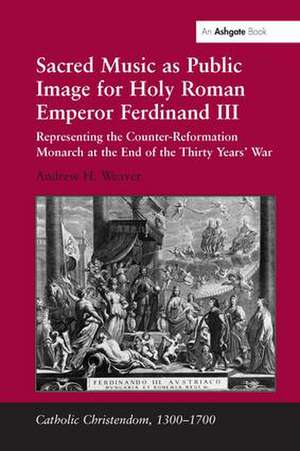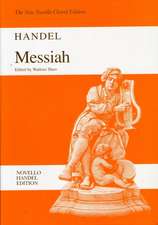Sacred Music as Public Image for Holy Roman Emperor Ferdinand III: Representing the Counter-Reformation Monarch at the End of the Thirty Years' War
Autor Andrew H. Weaveren Limba Engleză Hardback – 28 dec 2011
| Toate formatele și edițiile | Preț | Express |
|---|---|---|
| Paperback (1) | 469.34 lei 6-8 săpt. | |
| Taylor & Francis – 31 ian 2017 | 469.34 lei 6-8 săpt. | |
| Hardback (1) | 1069.71 lei 6-8 săpt. | |
| Taylor & Francis – 28 dec 2011 | 1069.71 lei 6-8 săpt. |
Preț: 1069.71 lei
Preț vechi: 1304.52 lei
-18% Nou
Puncte Express: 1605
Preț estimativ în valută:
204.71€ • 212.51$ • 170.70£
204.71€ • 212.51$ • 170.70£
Carte tipărită la comandă
Livrare economică 22 martie-05 aprilie
Preluare comenzi: 021 569.72.76
Specificații
ISBN-13: 9781409421191
ISBN-10: 1409421198
Pagini: 352
Dimensiuni: 156 x 234 x 21 mm
Greutate: 0.88 kg
Ediția:1
Editura: Taylor & Francis
Colecția Routledge
Locul publicării:Oxford, United Kingdom
ISBN-10: 1409421198
Pagini: 352
Dimensiuni: 156 x 234 x 21 mm
Greutate: 0.88 kg
Ediția:1
Editura: Taylor & Francis
Colecția Routledge
Locul publicării:Oxford, United Kingdom
Notă biografică
Andrew H. Weaver is Associate Professor and Chair of Musicology at the Benjamin T. Rome School of Music, the Catholic University of America, USA. He has also published editions of musical works by Ferdinand III, Giovanni Felice Sances, and other musicians from the Habsburg court.
Recenzii
'Richly illustrated with visual images and musical examples, this broad-based, fascinating and thoroughly researched study examines the ways in which the Habsburg Emperor Ferdinand III (r. 1637-1657) employed sacred music and other arts to project an image of himself as a champion of Catholic piety, a warrior for the Empire, and eventually as a peacemaker during the last stage of the Thirty Years' War.' Jeffrey Kurtzman, Washington University in St. Louis, USA
'Sacred Music as Public Image for Holy Roman Emperor Ferdinand III is a unique exploration of the nexus between art and politics. Combining the tools of social and political history, virtuosic archival work, and deft musical analysis, Andrew Weaver shows how Ferdinand III used sacred music to propagate, and later, to revise a triumphant, martial public persona during the Thirty Years' War. His insightful work illuminates early modern sacred music, Catholic devotional practices, the history of printing, and - most significantly - the ways in which a world leader sought to shape his own public image.' Steven E. Saunders, Colby College, USA
'Andrew H. Weaver’s lucid, jargon-free and admirably interdisciplinary study places the much-maligned younger Ferdinand in a new light... a book that will quickly establish itself as essential reading for anyone concerned with 17th -century Austria... Altogether a delight, this book should appeal not only to specialists but to everyone with an interest in Catholic Church music of the period.' Early Music Review
'... Weaver’s inspired scholarship stands as a valuable and exemplary model for further inquiry into the role of monarchical representation in sacred music of the seventeenth century.' Renaissance Quarterly
'In drawing on recent research by scholars of early modern history, Weaver brings to musicology a number of valuable concepts, such as monarchical representation (itself the subject of a far-reaching dialogue) as a negotiation between ruler and subjects, and the "top-down" approach. Weaver’ s exploration of the paratext, and his use of such material, provides a useful model for further research. His engagement with a range of different media, with circumstances of representation, and with a creative variety of written sources, positions the music in its cultural context, making this an important study for understanding how it was used and perceived.' Seventeenth-Century Music
'Sacred Music as Public Image for Holy Roman Emperor Ferdinand III is a unique exploration of the nexus between art and politics. Combining the tools of social and political history, virtuosic archival work, and deft musical analysis, Andrew Weaver shows how Ferdinand III used sacred music to propagate, and later, to revise a triumphant, martial public persona during the Thirty Years' War. His insightful work illuminates early modern sacred music, Catholic devotional practices, the history of printing, and - most significantly - the ways in which a world leader sought to shape his own public image.' Steven E. Saunders, Colby College, USA
'Andrew H. Weaver’s lucid, jargon-free and admirably interdisciplinary study places the much-maligned younger Ferdinand in a new light... a book that will quickly establish itself as essential reading for anyone concerned with 17th -century Austria... Altogether a delight, this book should appeal not only to specialists but to everyone with an interest in Catholic Church music of the period.' Early Music Review
'... Weaver’s inspired scholarship stands as a valuable and exemplary model for further inquiry into the role of monarchical representation in sacred music of the seventeenth century.' Renaissance Quarterly
'In drawing on recent research by scholars of early modern history, Weaver brings to musicology a number of valuable concepts, such as monarchical representation (itself the subject of a far-reaching dialogue) as a negotiation between ruler and subjects, and the "top-down" approach. Weaver’ s exploration of the paratext, and his use of such material, provides a useful model for further research. His engagement with a range of different media, with circumstances of representation, and with a creative variety of written sources, positions the music in its cultural context, making this an important study for understanding how it was used and perceived.' Seventeenth-Century Music
Cuprins
Introduction; I: Setting the Stage; 1: Ferdinand III's Public Image and the Thirty Years' War; 2: Justitia et Pietas; II: Means of Production; 3: Emblematic Sound; 4: The Politics of Printing; III: Music as Representation; 5: Musical Portraiture; 6: Mirrors and Models; 7: Maria Patrona Ferdinandi (et Austriae); Epilogue
Descriere
Ferdinand III played a crucial role both in helping to end the Thirty Years' War and in re-establishing Habsburg sovereignty within his hereditary lands. Ferdinand's accomplishments came not through diplomacy or strong leadership but through a skillful manipulation of the arts. Drawing upon recent methodological approaches to the representation of other early modern monarchs as well as upon the theory of confessionalization, Andrew Weaver places the sacred vocal music composed by imperial musicians into the rich cultural, political, and religious contexts of mid-seventeenth-century Central Europe.






